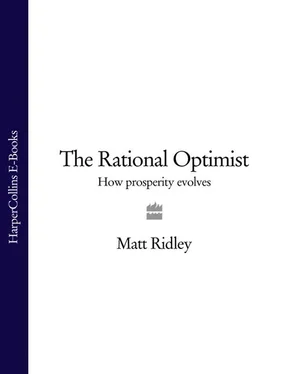This is a shame, because the zero-sum mistake was what made so many -isms of past centuries so wrong. Mercantilism said that exports made you rich and imports made you poor, a fallacy mocked by Adam Smith when he pointed out that Britain selling durable hardware to France in exchange for perishable wine was a missed opportunity to achieve the ‘ incredible augmentation of the pots and pans of the country’. Marxism said that capitalists got rich because workers got poor, another fallacy. In the film Wall Street , the fictional Gordon Gekko not only says that greed is good; he also adds that it’s a zero-sum game where somebody wins and somebody loses. He is not necessarily wrong about some speculative markets in capital and in assets, but he is about markets in goods and services. The notion of synergy, of both sides benefiting, just does not seem to come naturally to people. If sympathy is instinctive, synergy is not.
For most people, therefore, the market does not feel like a virtuous place. It feels like an arena in which the consumer does battle with the producer to see who can win. Long before the credit crunch of 2008 most people saw capitalism (and therefore the market) as necessary evils, rather than inherent goods. It is almost an axiom of modern debate that free exchange encourages and demands selfishness, whereas people were kinder and gentler before their lives were commercialised, that putting a price on everything has fragmented society and cheapened souls. Perhaps this lies behind the extraordinarily widespread view that commerce is immoral, lucre filthy and that modern people are good despite being enmeshed in markets rather than because of it – a view that can be heard from almost any Anglican pulpit at any time. ‘Marx long ago observed the way in which unbridled capitalism became a kind of mythology, ascribing reality, power and agency to things that had no life in themselves,’ said the Archbishop of Canterbury in 2008.
Like biological evolution, the market is a bottom-up world with nobody in charge. As the Australian economist Peter Saunders argues, ‘Nobody planned the global capitalist system, nobody runs it, and nobody really comprehends it. This particularly offends intellectuals, for capitalism renders them redundant. It gets on perfectly well without them.’ There is nothing new about this. The intelligentsia has disdained commerce throughout Western history. Homer and Isaiah despised traders. St Paul, St Thomas Aquinas and Martin Luther all considered usury a sin. Shakespeare could not bring himself to make the persecuted Shylock a hero. Of 1900, Brink Lindsey writes: ‘Many of the brightest minds of the age mistook the engine of eventual mass deliverance – the competitive market system – for the chief bulwark of domination and oppression.’ Economists like Thorstein Veblen longed to replace the profit motive with a combination of public-spiritedness and centralised government decision-taking. In the 1880s Arnold Toynbee, lecturing working men on the English industrial revolution which had so enriched them, castigated free enterprise capitalism as a ‘world of gold-seeking animals, stripped of every human affection’ and ‘less real than the island of Lilliput’. In 2009 Adam Phillips and Barbara Taylor arguedthat ‘capitalism is no system for the kind-hearted. Even its devotees acknowledge this while insisting that, however tawdry capitalist motives may be, the results are socially beneficial.’ As the British politician Lord Taverne puts it, speaking of himself: ‘a classical education teaches you to despise the wealth it prevents you from earning.’
But both the premise and the conclusion are wrong. The notion that the market is a necessary evil, which allows people to be wealthy enough to offset its corrosive drawbacks, is wide of the mark. In market societies, if you get a reputation for unfairness, people will not deal with you. In places where traditional, honour-based feudal societies gave way to commercial, prudence-based economies – say, Italy in 1400, Scotland in 1700, Japan in 1945 – the effect is civilising, not coarsening. When John Padgett at the University of Chicago compiled data on the commercial revolution in fourteenth-century Florence, he found that far from self-interest increasing, it withered, as a system of ‘reciprocal credit’ emerged in which business partners gradually extended more and more trust and support to each other. There was a ‘trust explosion’. ‘Wherever the ways of man are gentle, there is commerce, and wherever there is commerce, the ways of men are gentle,’ observed Charles, Baron de Montesquieu. Voltaire pointed out that people who would otherwise have tried to kill each other for worshipping the wrong god were civil when they met on the floor of the Exchange in London. David Hume thought commerce ‘rather favourable to liberty, and has a natural tendency to preserve, if not produce a free government’ and that ‘nothing is more favourable to the rise of politeness and learning, than a number of neighbouring and independent states, connected together by commerce and policy’. It dawned on Victorians such as John Stuart Mill that a rule of Rothschilds and Barings was proving rather more pleasant than one of Bonapartes and Habsburgs, that prudence might be a less bloody virtue than courage or honour or faith. (Courage, honour and faith will always make better fiction.) True, there was always a Rousseau or a Marx to carp, and a Ruskin or a Goethe to scoff, but it was possible to wonder, with Voltaire and Hume, if commercial behaviour might make people more moral.
Coercion is the opposite of freedom
Perhaps Adam Smith was right, that in turning strangers into honorary friends, exchange can transmute base self-interest into general benevolence. The rapid commercialisation of lives since 1800 has coincided with an extraordinary improvement in human sensibilitycompared with previous centuries, and the process began in the most commercial nations, Holland and England. Unimaginable cruelty was commonplace in the precommercial world: execution was a spectator sport, mutilation a routine punishment, human sacrifice a futile tragedy and animal torture a popular entertainment. The nineteenth century, when industrial capitalism drew so many people into dependence on the market, was a time when slavery, child labour and pastimes like fox tossing and cock fighting became unacceptable. The late twentieth century, when life became still more commercialised, was a time when racism, sexism and child molesting became unacceptable. In between, when capitalism gave way to various forms of state-directed totalitarianism and their pale imitators, such virtues were noticeable by their retreat – while faith and courage revived. The twenty-first century, when commercialisation has so far continued to spread, is already a time when battery farming and unilaterally declaring war have just about become unacceptable. Random violence makes the news precisely because it is so rare; routine kindness does not make the news precisely because it is so commonplace. Charitable giving has been growing faster than the economy as a whole in recent decades. The internet reverberates with people sharing tips for free.
Of course, these trends could be nothing more than coincidence: we happen to be becoming nicer as we become more irretrievably dependent on markets and free enterprise. But I do not think so. It was the ‘nation of shopkeepers’ that first worried about abolishing slave trading, emancipating Catholics and feeding the poor. Just as it was the nouveau riche merchants, with names like Wedgwood and Wilberforce, who financed and led the anti-slavery movement before and after 1800, while the old county money looked on with indifference, so today it is the new money of entrepreneurs and actors that funds compassion for people, pets and planets. There is a direct link between commerce and virtue. ‘ Far from being a vice,’ says Eamonn Butler, ‘the market system makes self interest into something thoroughly virtuous.’ This is the extraordinary feature of markets: just as they can turn many individually irrational individuals into a collectively rational outcome, so they can turn many individually selfish motives into a collectively kind result.
Читать дальше












